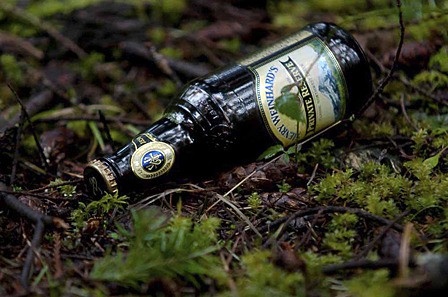The residents of White Beach Road are not happy.
Someone, for the past few months, has been dumping empty beer bottles by the side of the road.
Chris Gill, one of the residents in the area, hopped in his car last week, trash bag at the ready, and picked up more than 30 Henry Weinhard’s beer bottles – with the caps on.
“This person cares more about the neatness of their car than the neatness of their island,” Gill said. “There are about 20 bottles in Killibrew Lake that I couldn’t get to”
The same day Gill picked up more bottles, he stopped at two random locations on his way home from Eastsound. He discovered five Henry’s bottle with the caps on and three Budweiser cans.
“It all was within 50 yards either direction in my truck,” he said.
Gill is outraged at the rampant littering, but also at the presumed drinking while driving.
Sergeant Steve Vierthaler on Orcas says he’s only made a handful of arrests for littering – in most of those cases, drivers threw beer bottles out their window, in front of a patrol car.
“Abandoned cars are the number one kind of littering that we deal with,” he said. “County-wide we get one abandoned car a month. We get calls from time to time from somebody who has found garbage that has been dumped on their street. I’ve seen more of that lately. It’s the nature of the beast – people being evicted and the bad economy.”
Vierthaler says he walks his neighborhood everyday and sees litter on the roadside.
“I walk all the time, so I am aware of the problem,” he said.
Ecology program in San Juan County
Historically, San Juan County has received funding from the Department of Ecology to administer a litter pick-up program for both roadside garbage and illegal dumping sites. Counties across the state were recipients of the money, which is garnered from the state beverage tax. Funding for 2009-11 was cut by Governor Chris Gregoire.
San Juan County Solid Waste program manager Steve Alexander is currently applying for $36,000 in ecology funding to pay for a 2011-13 litter program.
“The money we are looking at all hinges on if the governor signs off on a budget,” Alexander said.
“That is how tenuous they are.”
Alexander says if the county receives funding, it will approach the program differently than in past years. Previously, a part-time supervisor led volunteers, parolees, and a paid youth crew to pick up litter. Now the program will be overseen by Alexander and administered by public works employees.
“We will continue to coordinate with groups to provide vests and equipment to help transport materials,” he said.
Currently, any citizen-led groups that gather bags of garbage can leave them at transfer stations for free. The group “Trash Masters” is one of the most active clean-up organizations in the county. Volunteers maintain stretches of road on San Juan Island. Lion’s Clubs and other volunteer groups in the islands periodically perform clean-ups as well.
Over the course of a year, Alexander said the county typically gather thousands of pounds of litter and illegally dumped garbage. Combined with what citizens drop off, the final amount is several tons. Some of the items Alexander has seen are a typewriter, a cash register, tires, pieces of farm equipment, and, of course, beer bottles.
“It’s remarkable how quickly a small stretch of road can reveal such weight,” he said.
Since the county lost its ecology funding, Alexander says he is not aware of more roadside garbage – but he wouldn’t be surprised to hear if the community is noticing an increase.
“To say it’s down or up or the same, I can’t validate that,” he said. “Quite frankly, whatever people say is going on, I am with them on that.”
Washington state litter laws
Over the past seven years, the Department of Ecology has conducted several focus groups to explore knowledge and attitudes towards littering. Many of these focus groups were comprised of people who admitted to littering behavior. When participants were asked what would convince them to not litter, a clear theme emerged. “Knowing I will be caught and fined,” was the number one deterrent to littering.
RCW 70.93.060 sets minimum fines for littering and illegal dumping. Local sheriff’s offices or health departments carry out most enforcement of litter laws. The fines range from $50 to $5,000, depending on the kind of littering. Littering more than a cubic yard is a gross misdemeanor and can bring up to a year in jail.
Report incidents of littering
Citizens who witness littering acts can call the hotline and report basic information such as date, time, location, objects thrown, the license plate of the vehicle, and a description of the vehicle. Department of Ecology staff will cross-reference the reported license plate with the Department of Licensing to get the name and address of the vehicle’s registered owner. The litter hotline is 1-866-LITTER-1.
For more information about how to coordinate litter pick-up groups in your area, call Steve Alexander at public works: 370-0500.



